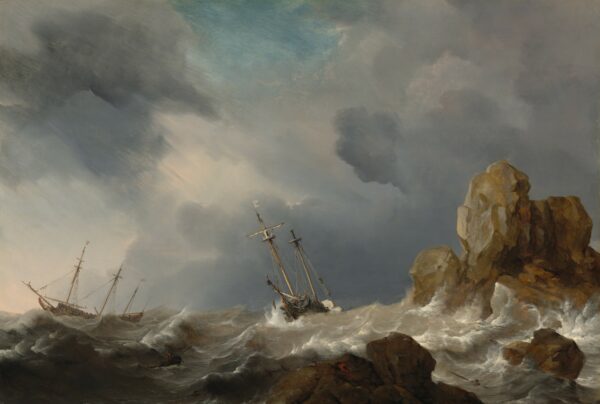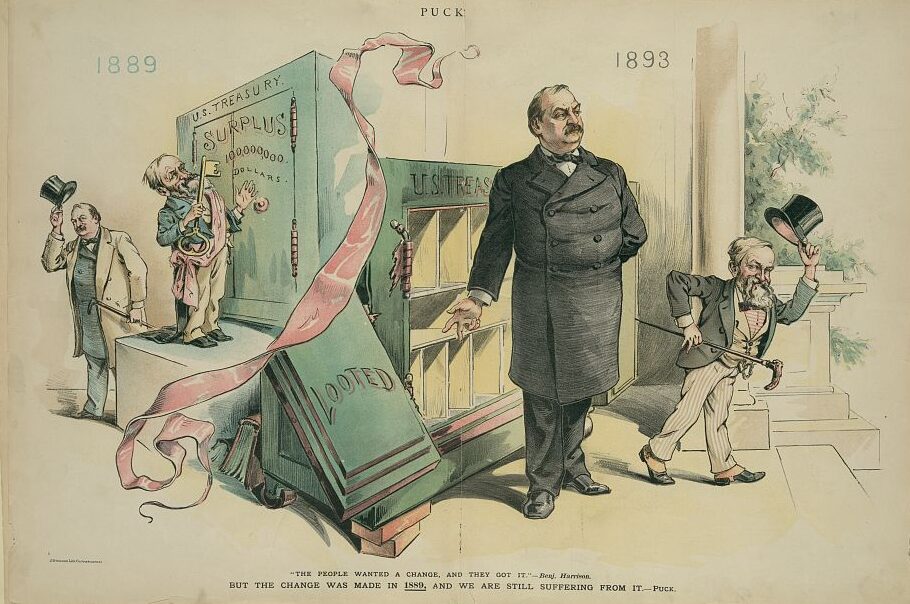In 1583, 440 years before the Titan submersible imploded off the coast of Newfoundland, the frigate Squirrel was lost at sea, all hands presumed dead. The captain was Humphrey Gilbert, the man sometimes credited with founding Britain’s overseas empire by claiming Newfoundland as English territory. Like Titan pilot Stockton Rush, Gilbert earned himself a watery grave chasing a moonshot: he set off across the North Atlantic trying to find a shortcut to Cathay (what Europeans then called China) and died on the return.

Despite the claims of so-called “disruptors,” rule-breaking arrogance is hardly a recent phenomenon. William van de Velde the Younger, Ships in a Gale, 1660. National Gallery of Art/public domain.
The English naval captains of the so-called Age of Exploration were the startup CEOs of the 16th century. As we witness a popular disenchantment with today’s high profile “innovators”—grifters—in finance and tech, we can reinterpret some well-worn history by imagining privateer-explorer-colonizers like Gilbert, Martin Frobisher, Richard Grenville, Walter Raleigh, and Francis Drake as tech bros. With a 21st-century framing, we see that these men were neither heroic swashbucklers nor problematic visionaries but exemplars of an all-too-familiar breed of opportunistic scammer. They styled themselves as daredevil disruptors, but what they were really doing was running speculative schemes and pushing untested strategies for cutting costs. They aspired to bypass business-as-usual trade and commerce by innovating new navigational IP. Instead of finessing algorithms, they obsessed over the Northwest Passage. They raced to pour money, brainpower, and occasionally human lives into the search for a shipping route to China through the perilous deathtrap of the frozen Arctic.
Englishmen had special cause to resort to this rampant risk taking. Powerful commercial empires controlled the Mediterranean, the Baltic, and overland trading routes in Africa and Asia. By the end of the 15th century, that dominance had already driven Iberians to seek out circuitous ocean detours and run aground in the Americas. With no holdings across the Atlantic and none of the resulting colonial riches the Spanish forced local inhabitants and enslaved Africans to extract, England at mid-16th century was a backwater among backwaters. To become competitive players in the global market, English merchants had to contrive dubious financing ploys. They realized they could fund the kind of speculative projects that required huge capital investments but were unlikely to pan out into near-term profits by limiting personal financial liability through the sale of shares in joint stock companies. The first such corporation, chartered in 1555, was the Company of Merchant Adventurers to New Lands—adventurers as in those who venture, or risk the loss of, capital. Venture capitalists invested in joint stock companies proceeded to fund every early English experiment in America.
They styled themselves as daredevil disruptors, but what they were really doing was running speculative schemes.
Then as now, private for-profit innovators relied on public subsidy. The English Crown extended explorers and their financiers protections that facilitated their long shots, precursors to the taxpayer-funded Titan rescue mission and Silicon Valley Bank bailout of recent headlines. In an incident we might emplot as a prequel to a Theranos or WeWork docuseries, Martin Frobisher’s announcement that he found gold on a 1576 voyage to Meta Incognita (Inuit homelands, current day Baffin Island, Canada) led to an early overvaluation of his Cathay Company. This triggered arguably the first known economic bubble, predating Tulip Mania, the infamous Dutch speculation frenzy, by 60 years. When the bubble began to burst, investors were barred from pulling out because the queen was personally invested. Frobisher did a short stint in prison when it all went sideways, but he was soon out, sailing off on the royal payroll to suppress the Irish and raid the Spanish.
The Crown also doled out trading monopolies. In 1578, Queen Elizabeth I granted Gilbert an exclusive patent to explore and take possession of any remote lands uninhabited by Christians, itself a risky legal and diplomatic strategy given Spain’s claim to possess most of the Americas. Yet much like the Silicon Valley free market, free speech absolutists who reap massive rewards from state intervention, explorers and their backers were obsessed with the doctrine of the free sea, the idea that governments should not, and could not, make laws regulating their naval activities.
Elizabethan writers who promoted voyages to America filled their pitches with a kind of techno-utopianism that stood in uneasy relation to the private profits they sought to extort from the New World. They made ambitious claims about the many social problems they would solve with their expansionist maritime schemes, among them English environmental ruin and economic inequality. Long before today’s billionaires blasted themselves into outer space, transatlantic explorers found it more thrilling—not to mention lucrative—to do this-changes-everything cosplay with their favorite gadgets than to pursue the hard work of addressing social ills at home. Like so many contemporary tech moguls who grew up on Cold War sci-fi but missed the anticapitalist, anti-imperial critiques, Gilbert is said to have drowned as he read aloud from a copy of Thomas More’s Utopia, a satirical report of an imaginary New World island where the inhabitants live in a state of perfect peace in the absence of private property.
It’s hard to muster much sympathy for Gilbert, who ignored his crew’s warnings that he’d charted their course straight for the Sable Island sandbar that took out the flagship Delight, then ignored their protests that the Squirrel wasn’t seaworthy, and took the helm blustering about how he was going to get £10,000 in seed money from the queen. Gilbert repeatedly refused to evacuate to the party’s sole surviving ship, the Golden Hind, when his frigate did indeed begin to sink after hitting a storm off the Azores. Death at sea was on brand for a gentleman swashbuckler. The real casualties of the Age of Exploration weren’t the captains who went down with their ships, but the forced migrants and impressed seamen who never chose to go to sea to begin with: the stream of Indigenous Americans that explorers kidnapped and paraded through Bristol and London as promo for their next big schemes until they succumbed to disease and probably heartbreak; an estimated 12.5 million Africans enslaved in the Atlantic slave trade so that Europeans could get cheap sugar, tobacco, and cotton; reimagined—the cut cost was stolen land, labor, and lives. Some two million Africans died at sea, tossed overboard on the Middle Passage.
The real casualties of the Age of Exploration weren’t the captains who went down with their ships, but the forced migrants who never chose to go to sea to begin with.
The move fast and break things ethos of the early modern period gave us dispossession, chattel slavery, and the Anthropocene. Self-proclaimed innovators looking to turn a profit have been trying to top the desperate, self-destructive corner-cutting it took the English to colonize America ever since. The story of transatlantic empire has been remembered as both epic and tragedy. But it was also a caper: the tale of a scam run amok, a bubble ripe for a burst, reckless profiteering masquerading as human advancement.
Arinn Amer is a history PhD candidate at the Graduate Center, City University of New York.
This work is licensed under a Creative Commons Attribution-NonCommercial-NoDerivatives 4.0 International License. Attribution must provide author name, article title, Perspectives on History, date of publication, and a link to this page. This license applies only to the article, not to text or images used here by permission.

